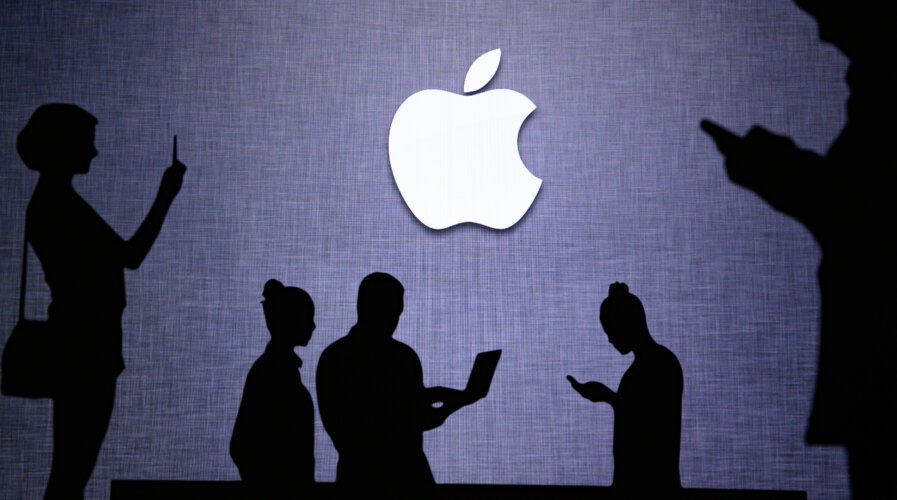
Apple at a crossroads with EU regulatory compliance and new product unveilings. (Source – Shutterstock).
Apple responds to EU regulations and unveils its latest tech innovations
- Apple adapts to new EU regulations, reshaping its App Store strategy.
- It has already faced criticism over its third-party fee structure.
- Apple revamps the iPad Pros and MacBook Airs with M3 processors.
Apple’s recent initiatives have thrust it into the spotlight, especially due to significant changes in the European Union, including updates to the App Store and iOS, as well as the release of new iPad and MacBook Air models. These developments suggest a future where the iPhone is more inclusive and less restrictive, a shift Apple may not have originally planned.
Apple Inc.’s extensive updates to its iPhone software, App Store, and Safari browser in the European Union go beyond mere regional adjustments. They provide insight into the potential future of the platform, a direction that could be adopted globally.
This overhaul addresses long-standing demands from users, developers, and regulators. Apple is set to introduce third-party app marketplaces, alternative in-app payment methods, and comprehensive game streaming services. Additionally, external companies will gain the ability to create tap-to-pay applications, making it simpler for users to switch their default browsers.
These modifications will lead to a more adaptable iPhone that is more accommodating to external software. But these changes are not without controversy. Alterations to the commission structure—the fees Apple levies on third-party app developers—might provoke new disputes with companies like Spotify Technology SA and Meta Platforms Inc., potentially reshuffling industry winners and losers.
The Apple strategy shifts in the face of new EU regulations
Apple’s adoption of these reforms appears somewhat reluctant, largely in response to the EU’s Digital Markets Act, which imposes strict new regulations on tech giants beginning in March.
Publicly, Apple has raised concerns about potential privacy and security risks as reasons for its resistance. Despite this, the company is taking significant measures to mitigate these issues. As it liberalizes the iPhone’s software, Apple is rolling out new anti-malware tools and warnings for both consumers and developers. Additionally, apps downloaded from outside the App Store are required to undergo a basic review and notarization process.
Bloomberg reports that a significant factor in Apple’s reluctance is the loss of control and potential revenue impact. The DMA poses substantial challenges to Apple’s services business, including an App Store operation that generates over US$20 billion per quarter. This includes the diminishing of Apple’s longstanding commission on external software, which ranges from 15% to 30% of transactions, and the threat to Apple Pay’s retail transaction revenue, as third-party tap-to-pay apps diminish Apple’s dominance on the iPhone.
Apple’s strategy to comply with the DMA is creative, but has already begun to irritate some developers. In response to EU regulator demands, Apple has significantly altered its commission structure, affecting its interactions with developers and the broader ecosystem of third-party billing services and app stores.
Under the new EU regulations, Apple has reduced the commission for developers who earned less than US$1 million in the previous year from 15% to 10%, as part of its recent “small-business program.” This lowered rate also applies to subscriptions after their first year. For developers earning over US$1 million, and for first-year subscriptions, the commission is now set at 17%, a marked decrease from the usual 30%.

Apple to comply with EU regulations. (Source – X).
These adjustments could motivate developers to remain within Apple’s ecosystem rather than seeking alternatives like potential iPhone App Stores from companies such as Microsoft Corp., Meta, or others.
Apple is introducing two new fees to compensate for the revenue lost from these reduced commissions. First, an in-app purchase billing fee of 3% is added to the 10% and 17% commission rates, although this fee is waived if developers use an external payment processor. Second, Apple has implemented a “core technology” fee, charging developers €0.50 for each app installation that exceeds 1 million annually. This fee applies to installations and updates via Apple’s App Store, third-party stores, the web, or the TestFlight testing service.
These supplementary fees are part of Apple’s strategy to balance its revenue streams while adhering to the new EU mandates and adapting to the changing digital market.
Emerging controversies and developer reactions between Apple and EU regulations
Spotify has recently lambasted Apple’s approach to complying with the Digital Markets Act as “a complete and total farce.” Starting in early March, developers will have the option to introduce alternative app stores on iPhones and circumvent Apple’s in-app payment system, which currently imposes commissions of up to 30%, per the bloc’s new rules.
Yet, under Apple’s new EU framework, developers will still be required to pay a “core technology fee” of 50 euro cents for each user account annually.
Spotify recently expressed dissatisfaction with this arrangement, noting that Apple has consistently shown reluctance to comply with the DMA and has now devised an unappealing alternative to the current system. Spotify would have to pay a 17% commission if it stays in the App Store and uses its own in-app payment method under the new terms.
In response, Apple clarified that developers can choose to continue under the existing terms, and with the new terms, more than 99% of developers would end up paying the same or even less to Apple.
Apple is at risk of severe repercussions if its App Store modifications do not comply with the forthcoming regulations, as the EU’s industry chief pointed out in a recent exclusive interview with Reuters.
Fortnite back to iPhones
In related developments, the well-known video game Fortnite is poised to make a comeback on iPhones after a four-year absence. Epic Games, the developer of Fortnite, will be allowed to operate its own app store on Apple devices, thanks to a new EU law designed to enhance competition. IPhone users are limited to downloading apps solely from Apple’s App Store, but starting in March, Apple will be required to let its EU customers access alternative app stores on iOS devices.
Apple has consistently maintained that its rules are necessary to protect user security. Through a post on X, Fortnite announced its intention to return to iOS, adding a message to Apple: “The world is watching.”
Epic Games previously removed Fortnite from the App Store due to a disagreement with Apple’s policies, resulting in its unavailability there since 2020, although it remains accessible through the web. Apple has faced criticism for creating what some perceive as a monopoly, compelling customers and developers to solely use its channels and charging up to 30% in commissions to developers.
The EU’s Digital Markets Act, soon to be implemented, aims to regulate significant companies that control access to services such as search engines and app stores. The goal is to establish a fairer market for established large and smaller companies. While these changes are not set to apply in the UK initially, the UK’s Digital Markets Bill, currently under parliamentary discussion, will likely subject Apple’s practices to comparable regulatory examination.
Tim Sweeney, the CEO of Epic Games, has strongly criticized Apple’s announcement, referring to it as “hot garbage” and specifically pointing out “junk fees on downloads.” This criticism likely targets the core technology fee, which charges developers €0.50 for each user who downloads their app beyond the first million. This charge applies to app developers, not to the consumers themselves.
Furthermore, Apple has announced its intention to broaden browser choices for EU users, enabling them to opt out of using Safari from the outset. However, the company cautions that this increased openness to alternative apps and stores could heighten security risks, potentially exposing customers to malware, fraud, and scams hidden in apps from other sources.
Apple insists that the changes it implements meet the requirements of the EU’s DMA while attempting to safeguard EU users from the increased privacy and security risks associated with the regulation. Apple, known for its premium-priced products and a focus on security, has noted that for apps using alternative payment processing, it will have limited ability to issue refunds and offer support to customers encountering issues, scams, or fraud. Unlike Apple, Android apps are available from a broader range of stores, leading to a higher incidence of malware on Android devices than those from Apple.
The primary objective of both the new EU regulations and the UK is to maintain open and competitive markets where various companies can operate successfully.
Apple’s upcoming products and industry competition
Apple’s electric vehicle project, reminiscent of Tesla’s efforts, has encountered further delays, pushing its launch to around 2028. Initially envisioned with a Level 4 self-driving system, Apple has scaled back to Level 2+ technology. The decade-long venture has been marred by leadership changes, layoffs, and strategy shifts. Apple’s board is now heavily involved, with the project’s future at stake: a failure of the current strategy could lead to the team’s dissolution.
Samsung is following Apple’s lead in digital healthcare innovation. The company is developing technologies like noninvasive glucose monitoring and continuous hypertension tracking, similar to Apple’s initiatives. Samsung’s latest watches also feature advanced sleep tracking and sleep apnea detection, indicating a competitive race in health-related features.
Upcoming Apple products, including new MacBook Airs and iPads, are nearing release. The lineup, expected in March, includes a significantly revamped iPad Pro, updated iPad Air models, and MacBook Airs with M3 processors. The new iPad Pros and 13-inch MacBook Air are already in production, with the first beta of iOS 17.4 hinting at new accessories and a landscape Face ID camera for the iPad Pros.
Following a period of stagnant sales, Apple’s next earnings report on February 1 is critical. Investors and analysts are bracing for flat revenue, marking Apple’s longest sales slump in years. Any revenue growth would be a significant turnaround. The report will be closely watched, particularly for insights into Apple’s performance in the challenging Chinese market.
READ MORE
- 3 Steps to Successfully Automate Copilot for Microsoft 365 Implementation
- Trustworthy AI – the Promise of Enterprise-Friendly Generative Machine Learning with Dell and NVIDIA
- Strategies for Democratizing GenAI
- The criticality of endpoint management in cybersecurity and operations
- Ethical AI: The renewed importance of safeguarding data and customer privacy in Generative AI applications


